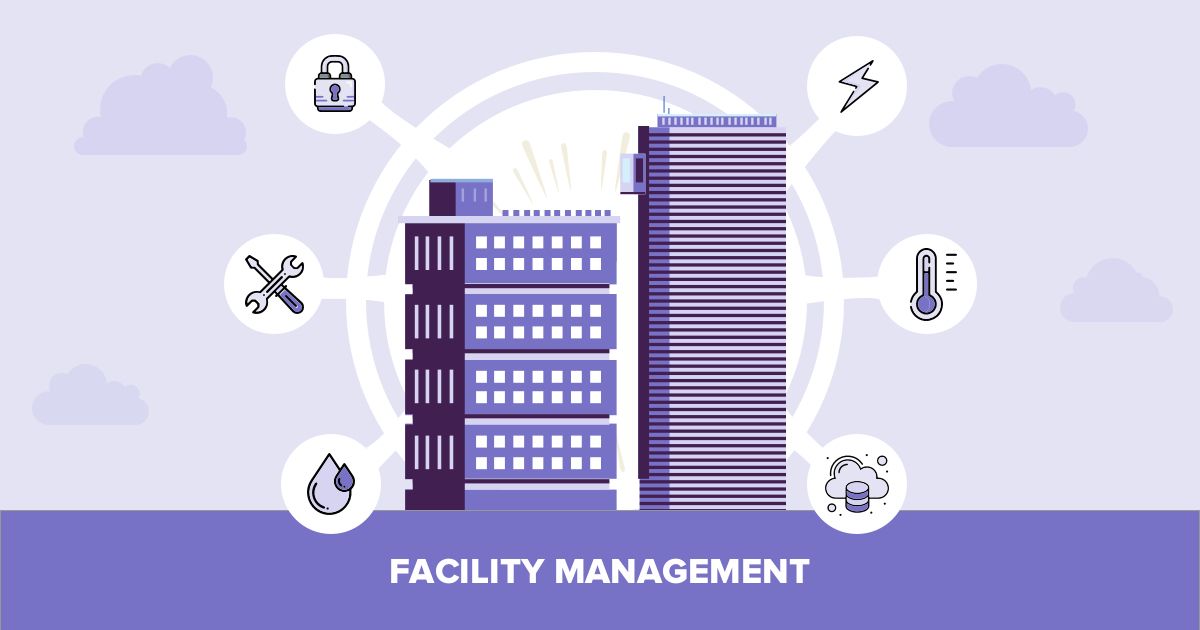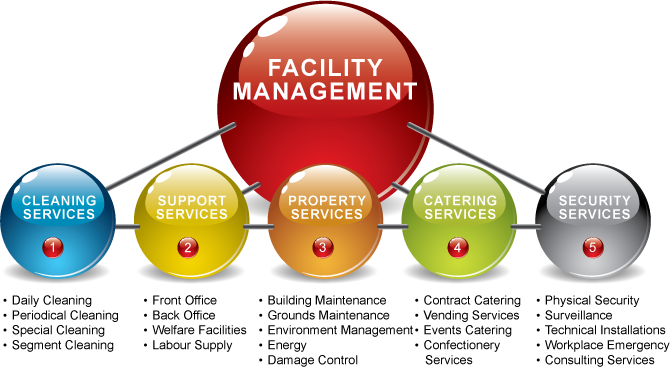Facility Management for Commercial Structures-- A Total Summary
Wiki Article
Trick Fads Shaping the Future of Facility Management in 2024
As we look in advance to 2024, the landscape of facility monitoring is poised for significant transformation, driven by numerous key patterns. The combination of clever building modern technologies and a change in the direction of data-driven decision-making promise to boost functional efficiency while focusing on sustainability in practice.Smart Building Technologies

Smart structure innovations include a wide selection of systems, consisting of intelligent illumination, cooling and heating controls, and security systems. By incorporating these systems, facility managers can check and change parameters in real-time, causing considerable reductions in power waste and functional expenses. For example, clever sensing units can identify tenancy levels and readjust lights and temperature accordingly, making sure that power is just made use of when required.
Moreover, these modern technologies promote enhanced information collection, allowing organizations to track use patterns and recognize opportunities for additional enhancements. The execution of clever structure innovations not only contributes to sustainability goals however likewise develops much healthier job atmospheres that can enhance worker performance and complete satisfaction.
As we relocate right into 2024, the adoption of smart building innovations will likely increase, showing a broader change in the direction of even more intelligent, responsive, and lasting center management methods.
Data-Driven Decision Making
Significantly, organizations are leveraging data-driven decision making to improve facility management practices. By utilizing data analytics, center managers can derive workable insights that significantly improve operational performance and source appropriation. The integration of advanced modern technologies, such as IoT sensors and real-time surveillance systems, enables the collection of large amounts of data on building efficiency, occupancy prices, and power intake.This riches of details permits facility supervisors to identify trends, predict upkeep needs, and proactively address issues before they intensify. Predictive analytics can anticipate equipment failures, lowering downtime and repair costs. In addition, information visualization tools help with much better interaction among stakeholders, making sure that informed decisions are made collaboratively.
Additionally, data-driven techniques enhance critical preparation by allowing center supervisors to analyze the performance of existing practices and make notified selections regarding investments in innovation or infrastructure. As organizations increasingly prioritize functional excellence, data-driven decision production is poised to come to be a cornerstone of effective center management methods in 2024 and past. Ultimately, the capability to leverage information properly will equip organizations to create a lot more efficient, efficient, and resistant centers.
Sustainability and Environment-friendly Practices
The focus on data-driven choice making normally straightens with the growing concentrate on sustainability and green practices within facility administration. As organizations increasingly focus on ecological responsibility, center supervisors are leveraging analytics to enhance resource use, decrease waste, and decrease carbon impacts. This tactical technique allows the combination of energy-efficient systems, such as LED lighting, smart cooling and heating controls, and renewable resource resources right into facility operations.Furthermore, the execution of lasting techniques prolongs past power intake. Center helpful site supervisors are adopting environmentally friendly materials and advertising recycling initiatives to develop a circular economy within their facilities. This not only boosts the ecological account of the organization yet likewise fosters a society of sustainability among workers.
Conformity with ecological policies is an additional essential aspect driving the fostering of eco-friendly techniques. By using information analytics, center managers can keep an eye on conformity metrics and identify areas for enhancement, making sure adherence to local and international sustainability requirements.
Crossbreed Job Designs
A considerable shift towards hybrid work versions is improving the landscape of facility administration in 2024. This paradigm incorporates in-office and remote work, necessitating a reevaluation of space application, source allocation, and staff member interaction techniques. Organizations are significantly acknowledging the significance of flexible work areas that accommodate diverse Home Page needs and preferences.Center managers need to adapt by applying functional workplace designs that sustain collaborative initiatives while offering locations for focused work. This includes the assimilation of technology to facilitate seamless interaction and cooperation among in-office and remote workers. Smart building solutions, equipped with sensing units and analytics, allow for real-time surveillance of room use, allowing companies to maximize their atmospheres effectively.
Additionally, crossbreed job models emphasize the requirement for efficient center management that prioritizes worker experience. This includes not only modern technology and room design but likewise the growth of policies that advertise a well balanced work-life dynamic. As companies navigate this transition, the duty of facility administration ends up being crucial in producing an active work environment that promotes productivity and drives business success. Essentially, the hybrid work version is changing facility administration, motivating an aggressive strategy to fulfill the progressing demands of the workforce.
Boosted Occupant Wellness
As companies welcome hybrid job versions, an enhanced focus on resident wellness is coming to be important to facility management techniques. Facility Management. This shift identifies that a healthy and pleased labor force straight influences efficiency and retention rates. Center managers are now focusing on settings that promote physical and mental wellness, incorporating aspects such as natural lights, biophilic style, and available wellness sources

Modern technology plays a crucial duty in this evolution. Smart building systems can monitor ecological elements and adjust settings in real-time, making certain optimum comfort levels - Facility Management. Comments devices, such as occupancy sensing units and staff member studies, allow facility managers to continually fine-tune wellness efforts based on passenger needs.

Verdict
In 2024, the future of center administration will be significantly affected by the combination of clever structure innovations and data-driven decision-making, cultivating enhanced operational effectiveness. These patterns jointly underscore the progressing landscape of center administration in response to contemporary difficulties and possibilities.Facility managers are advertising and embracing eco-friendly materials recycling campaigns to create a round economic climate within their facilities.A substantial shift in the direction of hybrid job versions is reshaping the landscape of facility administration in 2024.Moreover, hybrid job versions emphasize the requirement for efficient center management that prioritizes staff member experience.As organizations welcome hybrid job models, a heightened focus on occupant health is becoming essential to center administration strategies.In 2024, the future of facility monitoring will certainly be significantly influenced by the combination of wise structure modern technologies and data-driven decision-making, cultivating improved operational performance.
Report this wiki page